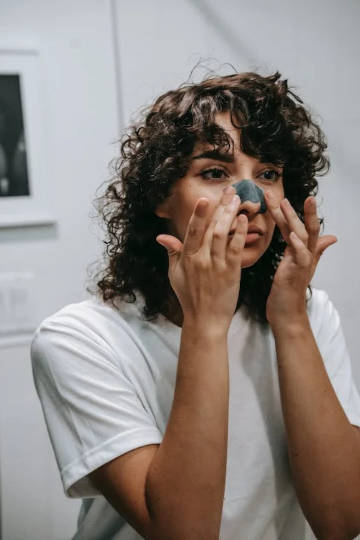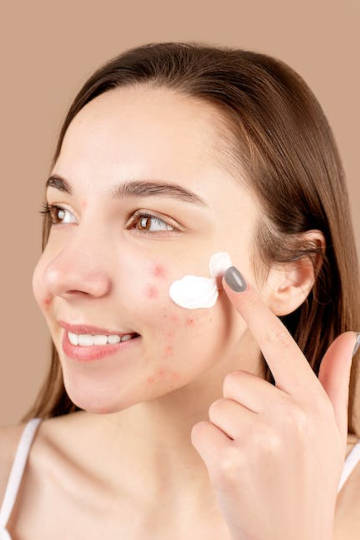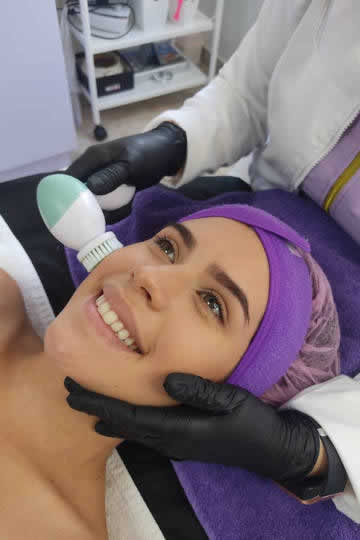How to Deal With Blackheads
This article provides an overview of how to deal with blackheads, their causes and the various skincare techniques you can use to treat and prevent them from reappearing.
Are you struggling with blackheads?
Read on to learn more about how to deal with blackheads.
 Blackheads are a common skin issue experienced by many people, especially those with oily skin.
Blackheads are a common skin issue experienced by many people, especially those with oily skin.
They can appear as small dark spots on the skin, often on the face and nose.
Fortunately, there are a number of treatments available that can help to reduce the appearance of blackheads and keep skin looking healthy and clear.
Definition of Blackheads
Blackheads are small, dark bumps on the skin caused by clogged hair follicles filled with sebum, bacteria and other debris.
They appear most commonly on the face, but can be found anywhere on the body where there are hair follicles. They typically appear on the nose, chin and forehead, but can also be found around the back, neck, chest and arms.
Blackheads occur when a pore becomes clogged with excess oil, dirt, and other impurities. The dark color of the blackheads is caused by oxidation, which happens when the air interacts with the oils that are stuck in the pores.
Blackheads are also referred to as open comedones and are one of the earliest forms of acne.
Causes of Blackheads
Blackheads are caused when excess oil and dead skin cells build up in the hair follicles.
A blackhead forms when the mixture of oil and dead skin cells is exposed to oxygen, which causes it to turn black in color. Clogged pores, hormonal fluctuations, and excess sebum production can all contribute to the development of blackheads.
Additionally, poor hygiene and overly aggressive skin care can also lead to blackhead formation. Wearing heavy makeup, using oil-based products, and not washing your face regularly can all lead to clogged pores and blackheads.
Hormonal changes during puberty, pregnancy, and menopause can also increase sebum production and lead to blackheads.
Tips for Prevention
There are several preventative measures that one can take to reduce the chances of developing blackheads.
Firstly, it is important to maintain a consistent skincare routine that includes cleansing, toning, and moisturizing. This will help remove dirt, oil, and other impurities from the skin and keep it healthy.
It is also important to exfoliate regularly to remove dead skin cells that can clog pores and lead to blackheads. Additionally, using a targeted skincare product such as a spot treatment or face mask that is specifically designed to fight blackheads can help reduce the occurrence of them.
Lastly, eating a balanced diet, drinking plenty of water, and getting enough sleep can all help promote healthy, clear skin.
Cleanse Your Skin Regularly
A cleanse of your skin should be an integral part of your skincare routine.
Regular cleansing helps keep your skin healthy by removing dirt, oil, and other impurities that can clog pores and lead to blackheads. You should use a gentle cleanser designed for your skin type, and make sure to use lukewarm water when washing your face – hot water can dry out your skin, leading to more blackheads.
Additionally, be sure to use a gentle, circular motion when cleansing to avoid irritating your skin. It's best to cleanse your skin twice a day, once in the morning and once at night. This will help keep your skin healthy and free of blackheads.
Avoid Excessively Oily Products
When it comes to skincare, it is important to avoid excessively oily products.
Oily products can often clog your pores, trapping dirt and bacteria beneath the surface and leading to blackheads. This is why it is important to choose products that are oil-free and noncomedogenic, meaning they won’t clog your pores.
Look for products that are labeled “oil-free,” “noncomedogenic,” or “water-based” and avoid products that contain heavy oils, like coconut oil, avocado oil, and mineral oil. These heavy oils can easily clog your pores and worsen your blackhead problem.
Furthermore, it is important to cleanse your skin regularly and avoid over-washing, as this can strip your skin of its natural oils and lead to an overproduction of oil, which can lead to even more blackheads.
Adjust Your Diet
Adjusting your diet to improve your skin health is one of the most important steps you can take to get rid of blackheads.
Eating a balanced diet that includes a wide variety of healthy foods and limiting processed and sugary foods can help regulate your hormones and reduce inflammation. This can help reduce the development of blackheads.
Eating foods that are high in antioxidants and omega-3 fatty acids, such as leafy greens, citrus fruits, fatty fish, nuts, and seeds, can help improve the overall health of your skin by reducing the production of oils that can clog pores and cause blackheads.
Additionally, drinking plenty of water to stay hydrated can help flush out toxins from the body and keep your skin clear and healthy.
Treatment Options
 Treatment options for blackheads vary depending on the severity of the condition.
Treatment options for blackheads vary depending on the severity of the condition.
Generally, mild cases of blackheads can be treated with over-the-counter skincare products that contain salicylic acid or benzoyl peroxide. These ingredients help to unclog pores and reduce the production of oil.
For more severe cases, a dermatologist may recommend a prescription medication, such as a topical retinoid or an oral antibiotic. Additionally, regular exfoliation, such as with a gentle scrub or chemical exfoliant, can help to remove dead skin cells and unclog pores to reduce the appearance of blackheads.
Other treatments such as chemical peels, laser treatments, and microdermabrasion may also be recommended for more stubborn blackheads.
Use a Facial Scrub
A facial scrub is an important part of any skincare routine and a great way to prevent and deal with blackheads.
Facial scrubs help to exfoliate the skin, removing dead skin cells, impurities, and other build-up that can clog the pores and lead to blackheads. It is important to use a facial scrub no more than two to three times a week, as over-scrubbing can irritate and damage the skin.
When using a facial scrub, be sure to use gentle, circular motions and avoid any harsh scrubbing. Afterwards, it is important to moisturize the skin to help keep it hydrated and supple.
Facial scrubs can also help to stimulate circulation and give the skin a healthy glow.
Over-the-Counter Topicals
These are topical creams and ointments that can be purchased without a prescription.
These products are formulated to help reduce the appearance of blackheads and keep the skin clear. Common ingredients found in these products include salicylic acid, benzoyl peroxide, retinoids, and alpha hydroxy acids.
Salicylic acid helps to loosen and dissolve dead skin cells that can clog pores, while benzoyl peroxide helps to reduce bacteria and inflammation.
Retinoids help to stimulate cell turnover and reduce the appearance of blackheads.
Alpha hydroxy acids help to gently exfoliate the skin and reduce the appearance of blackheads.
When used as directed, these products can help to clear the skin and reduce the appearance of blackheads.
Professional Treatments
 Professional treatments for blackheads can provide a more intense and longer-lasting solution than home treatments.
Professional treatments for blackheads can provide a more intense and longer-lasting solution than home treatments.
Treatments like chemical peels, dermabrasion, and laser treatments are all options for removing blackheads. Chemical peels use a chemical solution to remove the outer layer of skin and encourage the growth of new skin.
Dermabrasion uses a high-speed brush to exfoliate the skin and remove the blackheads.
Laser treatments use a laser beam to target the blackheads and break them up.
All of these treatments can be painful and may require recovery time, so it is important to discuss the potential risks and benefits with your doctor before undergoing treatment.
Consulting a Professional
If things get really bad, it can be a good next move to consult a professional to help you deal with blackheads.
A professional can provide you with advice and support to help you understand the causes of your blackheads and create a plan of action to resolve them. Professional skincare experts can also provide treatments that are more effective and tailored to your specific needs.
Professional treatments can include extractions, chemical peels, and laser treatments. These treatments are designed to remove blackheads, reduce oil production, and improve the overall appearance of your skin.
Additionally, a professional can provide you with advice on which products to use and how to use them correctly, as well as which lifestyle changes can help to prevent blackheads in the future.
Summary of Prevention and Treatment Tips
Here is a summary of some of the prevention and treatment tips for blackheads mentioned here for maintaining healthy skin.
The first step is to keep the skin clean. This includes washing the face twice a day with a gentle cleanser and exfoliating the skin at least once a week to remove dead skin cells and excess oils.
It is also important to keep the skin hydrated by using a moisturizer and to protect the skin from the sun with sunscreen.
Additionally, it is important to avoid using oil-based makeup or skincare products as they can clog pores and contribute to blackheads. For treatment, a variety of over-the-counter products are available, such as salicylic acid and benzoyl peroxide.
These products can help to reduce the appearance of blackheads and to prevent their formation.
Some people may also find relief from home remedies, such as using a mixture of honey and lemon juice to dissolve the blackheads. However, if these methods are not successful, it may be beneficial to seek medical advice from a dermatologist, who can provide more tailored treatment.
Conclusion
Blackheads can be difficult to address, as we have seen in this article that provided several measures that can be taken to help reduce or even eliminate them.
These included avoiding harsh cleansers, avoiding oil-based cosmetics, using a gentle exfoliating scrub and using a clay mask. These measures can help to reduce the appearance of blackheads and make the skin look healthier and more radiant.
Using a moisturizer or a spot treatment may help to reduce their appearance and keep the skin looking healthy.
If you are unsure which would be best for your situation, it can help to experiment with any of the different methods covered until you find the one that works best for you.
[BACK TO TOP]
Posted on Wed, Dec 14, 2022 in Skin Care